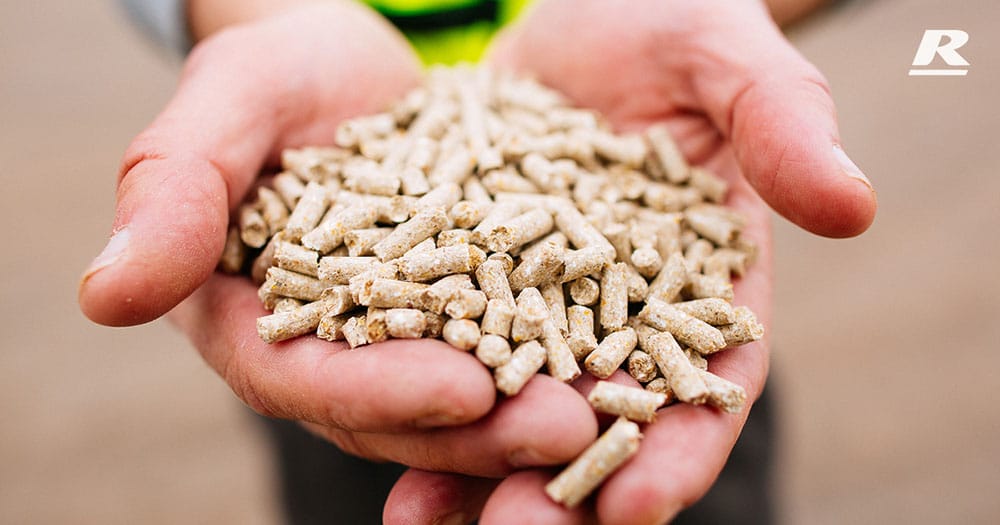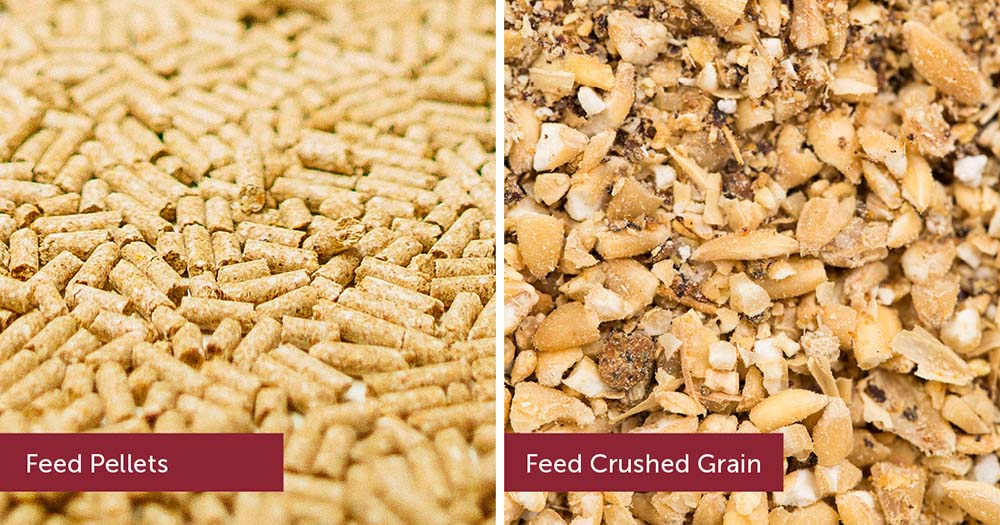Feed Pellets versus Feed Crushed Grain
Did you know that Reid Stockfeeds now have their own pellet mill in Camperdown? So what, you might say? Well, now there is another option for existing and potential new customers providing the same high quality product and back-up service that you have become accustomed to with Reids.

Why feed pellets – top 5 reasons
- The cereal and protein grains are hammer-milled (To a much smaller particle size) and heat treated to increase starch digestibility – this means that you won’t see grain coming through your cows. The increased digestibility of the starchy ingredients means we can feed less of them and get the same result as a crushed grain, or alternatively feed the same (assuming adequate buffering) and get a better outcome. The hammer-mill ensures that smaller or pinched grains can be effectively processed.
- A range of ingredients containing starch (including millrun, pea pollard, oats as well as wheat, barley and corn) are used/available that provide a staged fermentation in the rumen. This means that the production of glucose (the cow’s energy currency that is primarily made from starch derived building blocks) is optimised and cow intake isn’t negatively impacted as much (as can be the case with the use of only one or two starch sources.
- Pellets can utilise co-products (millrun from flour milling and pea pollard from packing peas, beans and lentils) from human food production to provide additional nutrients and help manage the cost. These ingredients are often great value and make a very handy contribution to a well-balanced pellet.
- Every mouthful is the same – there is no potential for separation (either in the silo or the stockfeeders), particularly for situations that require high mineral and additive content. They are often less dusty than crushed grain mixes, which can be a good outcome for asthma/hayfever sufferers.
- We offer a $25/t discount off the standard price for paying within 7 days from the date of invoice. That is a saving of over $600 per full truck load!
We can also offer contracts for ingredients to go into pellets, just like we have always done for crushed grain mixes. This will help put a cap on your price this year if you are concerned about how much higher grain prices might go. For specific circumstances, we can customise pellets for customers as well.

Why feed crushed grain – top 5 reasons
- In low cereal grain price years, they can be cheaper than pellets due to the lower manufacturing cost (approximately $50/t cheaper to manufacturer due to less labour and energy intensive processes)
- There are fewer limitations on additives (eg. Some probiotics) and some bulk ingredient inclusion rates as the manufacturing process is only limited by what will flow in and out of a silo.
- You can physically see what you are getting in the mix (assuming that you can pick the difference between crushed wheat and barley, and lupins versus corn)
- There is more feed testing done and research into wheat, barley, corn, lupins, and canola meal (all of which can be incorporated into a pellet anyway) than some of the other co-products that are used in pellets.
- If you are interested in high metabolisable energy (ME) or high starch (not to be confused with digestible starch or glucose production from it) formulations, this can be achieved more easily in a crushed grain mix
There may even be a few home-millers that might consider the price of our pellets (or crushed grain mixes) this year as grain availability becomes a bit harder. We can currently supply a pellet to many farmers throughout Victoria for around the same price as you can purchase whole grain to mill yourself. The pellet will be a balanced product with buffers, vitamins and minerals to meet the needs of your herd. And you won’t have to do the work – apart from giving us 3 days notice of needing another load.
Ultimately, whether you feed pellets or crushed grain it mostly comes down to personal preference of the customer. We can get the same great outcomes from either pellets or crushed grain. The decision is entirely up to you.
If you’d like to increase your livestock farming gains and get professional feeding advice. Call 1300 REID FEED or enquire here >